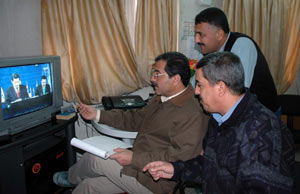
Three Iraqi men watch TV to learn the results of the
country's recent general elections, in Baghdad, capital of Iraq, on Feb. 13,
2005. Farid Ayar, spokesman for the Independent Electoral Commission, announced
on Sunday that the United Iraqi Alliance, backed by Iraq's Shiite leader
Ayatollah Ali al-Sistani, would garner 132 seats of the 275-member National
Assembly, a Kurdish alliance would get 71 seats and interim Prime Minister Iyad
Allawi's party would have 38 seats. (Xinhua Photo)
Sunday's Iraqi election results showed a Shiite list has won nearly half of
the vote, followed by the Kurdish list and an alliance led by interim Prime
Minister Iyad Allawi.
The United Iraqi Alliance, backed by Iraq's Shiite
Grand Ayatollah Ali al-Sistani, won 4.075 million votes, or 48.1 percent of the
ballots.
A Kurdish alliance followed with 2.175 million votes, or about 25
percent, while 1.168 million votes went to interim Prime Minister Iyad Allawi's
list.
About 8.55 million Iraqis cast their votes in the elections, about 59
percent of registered voters, the electoral commission said.
However, turnout
in Iraq's Sunni areas was rather low, as many Sunni Arabs had boycotted the
elections or stayed away out of fear. In some areas, the turnout was as low as 2
percent.
The three lists will take 239 seats and the remaining 36 will be
shared among other lists, including the list of Ghazi al-Yawar, the interim
Iraqi president whose party won only five seats.
About 69 seats will go to
women candidates, which means a fourth of the parliamentary seats have been
reserved for women, the highest percentage in the Arab parliaments.
Although
the Shiite list is likely to take 132 seats, the result was still considered
under expectation as some top Shiite officials had estimated a 60 percent
win.
Anyway, controlling nearly half of the seats would be influential enough
in the political process of the transitional period, which would last until the
next elections, analysts said.
The Shiite list has to ally with other parties
or individuals to secure its goal of forming a government.
Before results
were announced, head of the Supreme Council for Islamic Revolution in Iraq Abdul
Aziz Al Hakim, who tops the Shiite list, said his list contained many qualified
figures capable of taking any post, but he stopped short of naming one.
It
was reported a Shiite leader would have the post of the prime minister, a Sunni
would be the president and a Kurd the speaker.
The Shiite list nominated more
than four candidates for the post of prime minister -- Ibrahim Al Jaafary, head
of Daawa Party, Adel Abdul Mehdi, interim Iraqi finance minister, Ahmed Al
Chalabi, head of National Conference Party and Hussein Al Shahristani, a nuclear
scientist who is very close to Sistani.
Among the four, Jaafary, who holds
the vice presidency, becomes a potential candidate to take the top portfolio as
he has been seen consulting with US officials and Iraqi leaders.
However,
observers say the consultation may at last lead to a compromise to allow Allawi
to stay in his post as the prime minister, since Jaafary's National Accord has
only got 38 seats.
In an interview with the UAE-based al-Arabiya TV channel,
Hakim kept the door open for accepting figures not from his list to take top
positions, although some observers said he won't give up the chance to grab the
media in the next months.
The Kurds have also won a political influence,
wining a percentage more than their population percentage, due to a high turnout
in the Kurdish region in the north.
The results also showed that the biggest
looser might be the well-known veteran Sunni politician Adnan al Pachachi, who
had been tipped as president but did not win a single seat.
"It is clear,
from the number of the voters, that most Iraqis in certain areas did not
participate in the elections," he said, but noted that the focus should be on
writing the constitution and preparing for a more representative election by the
end of 2005.
In the next stage, the elected assembly will choose a president
and two deputy presidents, who will in turn designate a prime minister to form a
cabinet.
Once the cabinet is approved by a majority of the assembly, the
prime minister will lead the transitional government.



